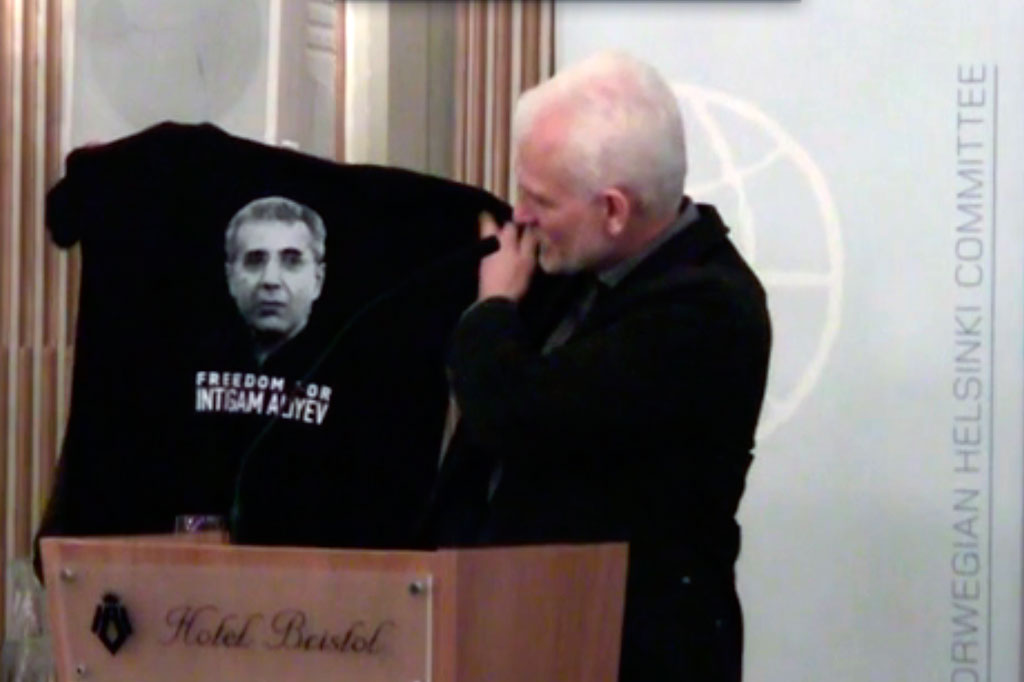The undying 'last' dictatorships of Europe
My name is Ales Bialiatski. If it had not been for the relentless mobilisation of the international community, the European Union in particular, I would be writing these words behind the bars of the Bobruisk high-security penal colony in south-eastern Belarus.
I was freed in June 2014, but other political prisoners are still held in European jails, notably in Belarus and Azerbaijan. My country has often been labelled the “last dictatorship of Europe,” but it seems there is still some competition for this sad title.
In Belarus, restrictions on freedom of expression, association and assembly remain high, as seen by the frequent politically-motivated administrative arrests and arbitrary detentions.
A judiciary system subservient to the government carried out three capital executions in 2014 and two executions are currently pending. And there is no prospect for democratic change in the November 2015 elections.
In Azerbaijan, since 2014, the authorities have intensified the systematic crackdown on democratic supporters. Dozens of peaceful human rights defenders, journalists and lawyers are currently in prison and independent civil society is vanishing, suffocating from frozen bank accounts.
While they undertake crackdowns on their own populations, Presidents Lukashenko and Aliyev are striving to attract international attention.
Lukashenko, buoyed by his role as intermediary in the Ukraine negotiations, seems to be progressively rejoining the concert of European leaders. Aliyev hopes to gain respectability through the organisation of the first European Olympic Games in June (this has prompted a number of NGOs to join the ‘Sport for Rights’ initiative to present a realistic picture of Azerbaijan and the crackdown on civil society).
What is the European Union's position regarding these cases?
In Belarus' case, the EU has repeatedly insisted on the importance of releasing political prisoners to make way for the normalisation of relations.
This is necessary, but not sufficient.
The EU must clearly set out the end of the harassment of civil society actors and a moratorium on the death penalty as preconditions. It should also set up specific benchmarks for progress in exchange for a future gradual lifting of sanctions, and – if adequate measures are taken – a future gradual resumption of bilateral aid and trade and investment relations.
As for Azerbaijan, the EU has not set clear human rights prerequisites for the strategic agreement that the Azeri authorities could propose before the Eastern Partnership Summit in May.
How can political prisoners hope for liberation if EU member states openly show that they are not ready to honour their commitment to put their “full weight behind advocates of liberty, democracy and human rights” as stated in the EU Strategic Framework on Democracy and Human Rights?
Eastern Partnership under pressure
The Eastern Partnership has been under increasing pressure in the last months. The crimes committed in Maidan, Crimea and Donbass in Ukraine, Armenia’s decision to join the Russia-led Customs Union, and the Azerbaijan authorities' intensifying crackdown on civil society all represent serious challenges to the original ambitions of the Eastern Partnership project, which was to have all EU Eastern neighbours progress on human rights.
In this difficult context, the EU must remain united in its refusal of any regression in the domain of human rights in the Eastern neighbourhood.
For example, until recently, my country was the last country in Europe where the death penalty was still legal. Few have noticed that the de facto authorities in the Donetsk People's Republic and the Lugansk People's Republic reintroduced the death penalty last year. And that this is in imposed by unregulated military tribunals.
This illustrates the wider human rights vacuum and increasing authoritarianism that exist in the disputed territories of Eastern Europe. In Transnistria, Abkhazia, South Ossetia, Nagorno-Karabakh, Crimea, Lugansk and Donetsk, more than five million people live under the rule of de facto authorities, where their human rights are violated and for which it seems there are no effective remedies at the national or international level.
The so-called 'frozen conflicts' mentioned above will last for decades.
The EU cannot afford to leave the human rights of the inhabitants of these disputed territories go unprotected. Pro-democracy activists in Belarus, Azerbaijan and the other Eastern European countries also need the EU to propose a long-term strategic vision for human rights that is in line with their demands and endeavours.
If Europe wants to be strong, it should support peoples' demands for more human rights and democracy in all neighbourhood countries in an equal manner. Difficult geostrategic constraints make this task more difficult, but also more necessary than ever.
Ales Bialiatski is Chairman of Human Rights Centre 'Viasna' and Vice-President of the International Federation for Human Rights (FIDH)
Source: euobserver.com


















